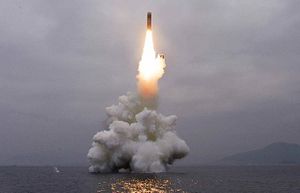France, the United Kingdom, Germany, Belgium, and Poland—the five European members of the United Nations Security Council—called on North Korea on Tuesday to give up its weapons of mass destruction in a complete, verifiable, and irreversible manner.
The statement was the first to emerge from a Security Council session since North Korea announced a successful test of the Pukguksong-3 submarine-launched ballistic missile—its first test of a nuclear-capable ballistic missile in nearly two years.
The countries called on North Korea “to take concrete steps” toward giving up its nuclear weapons and ballistic missiles. Belgium, Poland, and Germany are nonpermanent members of the Council while France and the UK are permanent members. All five are members of the European Union.
The states described North Korea’s missile launch activity this year as dangerous for “regional security and stability, and they are in clear violation of U.N. Security Council resolutions.” “It is vital that the Security Council upholds its resolutions. International sanctions must remain in place and be fully and strictly enforced,” they added.
The statement called on North Korea “to engage in good faith in meaningful negotiations with the United States.” The first working-level talks between the United States and North Korea since February 2019 took place in Stockholm, Sweden, over the weekend and quickly broke down.
Following the breakdown of talks, the North Korean side said that it would not return to the table until the United States undertakes a “complete and irreversible withdrawal of the hostile policy.”
After the announcement of the Security Council meeting on Monday, the North Korean permanent mission to the United Nations in New York criticized the meeting, saying that it would increase “our desire to defend our sovereignty.”
Kim Song, the North Korean ambassador to the United Nations, said that he believed the United States was “behind the impure moves.” He implied that Washington had pushed France, the UK, and Germany to call for the closed session.
On Tuesday, North Korea’s Korean Central Television carried, for the first time since the start of leader Kim Jong Un’s diplomatic charm offensive in early 2018, images of the country’s 2017 intercontinental-range ballistic missile tests.
Footage showed significant moments in the development of North Korea’s ICBMs, including the March 18, 2017, test of a high-thrust engine, the July 4, 2017, test-flight of the Hwasong-14 ICBM, the July 28, 2017, second test of the Hwasong-14, and the November 28, 2017, test of the Hwasong-15.
Earlier this year, Kim Jong Un warned that North Korea would pursue a “new way” if the United States did not change its negotiating stance by the end of the year.































